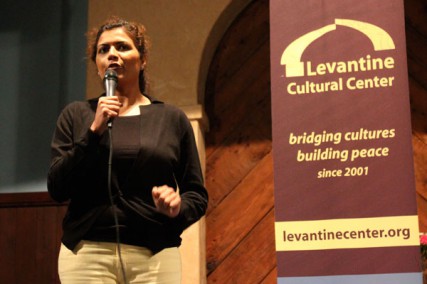
LOS ANGELES — Unshaven and wearing a black hoodie and cap, Omar Elba looked out from the lectern, surrounded by a gold cross and organ pipes. “Moses, you are my nizzle fo' shizzle,” said the Egyptian-born Muslim comedian, doing his best to channel Snoop Dogg.
It's a joke he's done before, but never in a church.
The unique setting of their performance inside Westwood Hills Congregational Church wasn't lost on any of the performers at the Sultans of Satire comedy show. Yet the sacred stage didn't keep them from swearing or talking about sex, although it inspired more jokes about growing up Jewish, Muslim, and Christian than one might typically hear during stand-up.
“I don't know whether to tell jokes or tell you my confessions,” Elba said, opening up the show.
Produced by the Levantine Cultural Center, which is dedicated to highlighting Middle Eastern and Arab culture, the Sultans of Satire stand-up show aims to challenge stereotypes and sensitivities while bringing people together with a few laughs.
While only about 50 people came to the Westwood Hills fundraising event, it would only take the right person in this town to see the act and put it on television. And “that'd carry along the entire cultural center,” said Jordan Elgrably, the Levantine's co-founder.
Elgrably started the Sultans of Satire in November 2005, the same month that Comedy Central started its higher profile Axis of Evil comedy tour. Engaging youth has been a goal of the cultural center since its founding in 2001.
“We didn't want the Levantine Center to be about preserving cultural heritage and presenting Middle Eastern culture only in terms of folklore,” Elgrably said. “Americans have no problem looking at beautiful calligraphy … but what about provocative ideas?”
The Sultans of Satire know how to do provocative, but by 2008, the show had lost some of its edge. “Some of the comedians were just doing the same hairy Arab jokes over and over, and that got boring,” Elgrably said.
The show had run monthly at L.A. comedy clubs such as the Laugh Factory, but Elgrably decided to wind it down, saving it for special occasions. He brought it back this summer as a monthly gig at the Levantine center, with additional shows elsewhere.
More than a decade after 9/11, current events continue to give the comedians enough fresh material to complement their riffs on family life and dating. Hair jokes still get laughs.
“My girlfriend's Persian, so you know what that means,” riffed half-Persian, half-Indian Sikh comedian Omid Singh. “She's got an even bigger beard than me.”
Singh has learned that conspiracy theories about 9/11 don't “fly” with this audience. But the diverse audience appreciated jokes about the fear of Muslims, Arabs, or anyone with dark skin.
“I'm just as scared of my people as you are,” Jordanian comic Mike Batayeh said, explaining that he'll say something in Arabic when he sees a suspicious looking Arab on a plane. “Like if anything goes down, he's going to spare me.”
“Black person, you're welcome, by the way,” he also joked, calling out Susanne Bronson, an African-American audience member. “Nothing good came out of 9/11. Nothing except for the first time in American history, you guys are not public enemy No. 1.”
“We appreciate it,” Bronson shouted back with a laugh.
Her own background has taught her the importance of laughter. “When you're part of a demographic that people are afraid of, humor is very good,” she said. “It disarms people.”
Mona Shaikh, a Pakistani immigrant who runs the Muslims Do It Better website that pokes fun at the conservative culture that she grew up in, expects that her material would offend Muslims — much of it couldn't be printed in a family newspaper.
The recent fundraiser was Shaikh's second Sultans of Satire show. After her first show, she was surprised to hear compliments from Muslim women in head scarves.
“Folks are actually much more open-minded than I give them credit for,” she said. “Comedy is such a powerful tool. It lets you talk about really heavy topics in a very entertaining way.”
Through her website, she's heard from Muslims from Pakistan to Morocco, and most love her work. But one or two people have also asked her to stop, and she jokes that the Taliban has issued a fatwa, or religious edict, against her.
Batayeh, who was raised Catholic, has had Muslims compliment and chastise him for talking about Islam's Prophet Muhammad. People seem more sensitive these days, said the Sultans of Satire regular, but that didn't stop him from saying that Muhammad “pulled the hottest girl, the richest girl in the land.” It's intended as a compliment, he said.
“Sometimes you want to bring up some topics that are going to be fodder for discussion afterwards. You want some kind of reaction as opposed to none,” he said. But ultimately the goal is to make them laugh, and when people are able to lose their inhibitions, it's magical, he added.
“It's almost like a church,” Batayeh said, noting the irony of the fundraiser's location. “They say we're all connected somehow, but you really feel that through laughter. … It just does something to the human spirit.”
“Hopefully,” he added before the show, “the church doesn't collapse upon us.”









